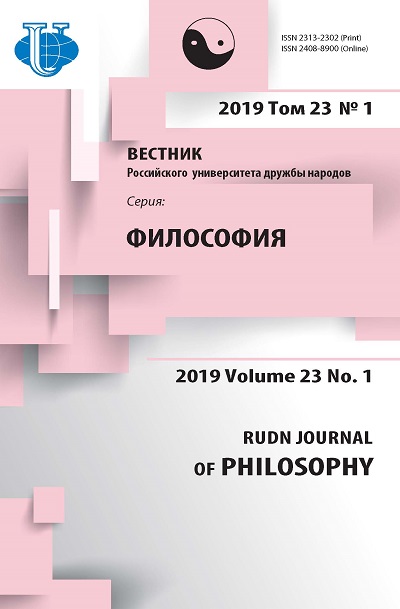THE PROBLEM OF UNIVERSAL SALVATION IN THE TEACHING OF RASHID RIDA
- Authors: Mukhetdinov DV1
-
Affiliations:
- Moscow Islamic Institute
- Issue: Vol 23, No 1 (2019)
- Pages: 32-45
- Section: HISTORY OF PHILOSOPHY: WEST-RUSSIA-EAST
- URL: https://journals.rudn.ru/philosophy/article/view/20947
- DOI: https://doi.org/10.22363/2313-2302-2019-23-1-32-45
- ID: 20947
Cite item
Full Text
Abstract
The problem of salvation of non-Muslims is a crucial element in the discourse of Islamic modernism. It was no less important for such Islamic thinkers of the classical period as Ibn Qayyim al-Jawziyya and Abu Ḥamid al-Ġazali. The attention of the author of the present paper focuses on understanding the problem of salvation in the teaching of Muhammad Rashid Rida, who was one of the key participants in the modernist movement in Islam. Being a representative of “intellectual salafism”, Rashid Rida proposes a solution for the issue of salvation that comes as an alternative for traditionalist views predominating in Sunni Islam. The present paper serves to prove that Rida’s quite peculiar solution is deeply rooted in Islamic tradition. In particular, it relates to viewpoints of al-Jawziyya and al-Ġazali, which deflect from mainstream. Similar to many other Islamic modernists (we can consider as part of them proponents of Jadidism, such as M. Bigiev, Z. Kamali, R. Fahreddin and others), the main although not the only argument of Rida is based on the Quranic idea of all-embracing Divine grace. In his analysis of Rida’s position, the author notes that the former does not lean towards the liberal variant of Islamic reformism that supposes religious pluralism as one of its basic ideas. Advocating the superiority of Muhammad’s message, the Egyptian thinker adhered to a specific form of soteriological inclusivism that differs from religious pluralism. According to Rida, the main criterion for one’s salvation is whether one was touched upon by undistorted Islamic message or not. Rida was convinced that Gehenna only awaits those non-Muslims who received undistorted Islamic message, clearly understood its Divine source and thenintentionally rejected it. But even they may be redeemed, as God is not obligated to act on his declared threat.
Keywords
About the authors
D V Mukhetdinov
Moscow Islamic Institute
Author for correspondence.
Email: kolomietsgg@yandex.ru
-
12 Prospect Kirova, Moscow, Russia, 109382References
- Bigiev M. Evidences of Divine Mercy. Islamic thought: tradition and modernity. Religious and philosophical Yearbook. Moscow: Medina-Publ.; 2016: 131―188. (In Russ).
- Kamali Z. Philosophy of Islam. 2 Vols. Kazan: Tatar book publishing house, 2010. (In Russ).
- Fahraddin R. The problem of divine mercy. Islamic thought: tradition and modernity. Religious and philosophical Yearbook. Moscow: Medina-Publ.; 2016: 189—200. (In Russ).
- Muhetdinov DV., Boroday SY. The Problem of religious pluralism and salvation in the works of Muhiddin Ibn Arabi and its place in the history of Islamic thought. Islamic thought: tradition and modernity. Religious and philosophical Yearbook. Moscow: Medina-Publ.; 2017: 603—634. (In Russ).
- Shahrur M. The Qur’an, Morality and Critical Reason. The Essential Muhammad Shahrur. Leiden, Boston: Brill, 2009.
- Sorush A. “Hope to go back in the ages before modernism, is to hope for the impossible..”. Islamic thought: tradition and modernity. Religious and philosophical Yearbook. Moscow: Medina-Publ.; 2017: 652―674. (In Russ).
- Rida MR. Tafsir al-Qur’an al-hakim al-shahir bi-tafsir al-Manar. 12 vols. Beirut: Dar alMa‘rifah, 1970.
- Al-Gazali A. Criterion of distinction between Islam and heresy. Islamic thought: tradition and modernity. Religious and philosophical Yearbook. Moscow: Medina-Publ.; 2016: 201—242. (In Russ).
- Gajnutdin RI., Muhetdinov DV. The problem of faith and salvation in the writings of Abu Hamid al-Ghazali. Islamic thought: tradition and modernity. Religious and philosophical Yearbook. Moscow: Medina-Publ.; 2016: 27―69. (In Russ).
- The Holy Qur’an. Translation and commentaries of ‘Abdullah Yusuf ‘Ali. Moscow: MedinaPubl.; 2015.
- Ibn al-Qayyim al-Jawziyya. Hadi al-arwah ila bilad al-afrah. Amman: Dar al-fikr; 1987.
- Bigiev M. Why the West progressed and the world of Islam fell in decay. Musa Bigiev’s Heritage. Documents and Materials. Vol. 2. Kazan; 2000. p. 70—78.
- Khayrutdinov AG. The Last Tatar Theologian. Life and Heritage of Musa Jarullah Bigiev. Kazan: Iman; 1999.
- Interview with Muhammad Arkoun. Minaret of Islam. 2016; (3―4).
- Ashk P. Dahlen. Islamic Law, Epistemology and Modernity. Legal Philosophy in Contemporary Iran. London: Routledge, 2003.
Supplementary files















